Relinquishing the Desire for Pratiṣṭhā
- Details

by Śrīla Saccidānanda Bhaktivinoda Ṭhākura
To the degree that we endeavour to develop ourselves spiritually, to become religious, to maintain a renounced life, and to deliberate on and discuss jñāna, we desire our own honour and distinction (pratiṣṭhā). This desire contaminates our hearts and pollutes our characters. Although we make a great effort to control lust, anger, greed, illusion and envy, and although we perform severe austerities to control the senses, concealed within our hearts the desire for pratiṣṭhā, in the form of a wild infant animal, continues to grow...
Our Goal of Life
- Details

In the Gambhira, along with Raya Ramananda and Svarupa Damodara, Sri Caitanya Mahaprabhu used to hear all these sweet pastimes of Krsna. At that time His transcendental body was full with ecstatic symptoms. Sometimes the limbs of His body entered into His body and He became like a tortoise, and sometimes other symptoms manifested. If you will remember all these sweet pastimes, your life will be successful...
The Passing of a Devotee
- Details
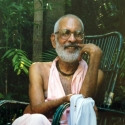
If anyone will call out these names, Jaya Rupa Santana, Bhatta Raghunatha….. they will mercifully come and give mercy to that Sadhaka so that all anarthas and little things will go away and Krishna prema will come...
Two Morning Walks
- Details
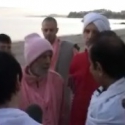
In the beginning of one's devotional practices, by hearing about the Lord's pastimes, one my want to serve Sri Sri Radha-Krsna and he may also want to serve Sri Ramacandra. In that case he will think about Rama and His associates like Hanuman, Bharata, and Laksmana, and he will also meditate on Sri Krsna's pastimes with His sakhas, or with Nanda Baba and Yasoda, or with the gopis. In other words, in the beginning one is not situated in his permanent relationship, so one will sometimes be attracted to a particular relationship when he hears about it, and at other times one may become attracted to another service relationship when he hears about it.
Questions at the Airport - Hong Kong
- Details
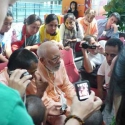
It may be that they have two constitutional forms – one in Krsna’s pastimes and also one in Mahaprabhu’s pastimes. Srila Kavi Karnapura has explained this in his book, Sri Gaura-ganodessa-dipika, and Srila Rupa Gosvami has explained this in his Radha-Krsna-ganodessa-dipika. Srila Kavi Karnapura has written that in Gaura-lila (Mahaprabhu’s pastimes) Radhika is Sri Gadhadhara Pandita, Lalita-devi is Sri Svarupa Damodara, and Visakha-devi is Sri Raya Ramananda. He has told everything in this regard...
Closing Words
- Details
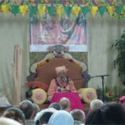
Depend on Sri Krsna. At least develop saranagati, practicing the six types of surrender – always consider that Sri Krsna is your protector. No other person can protect you. Depend on Krsna, not anyone else. Be like Gangamata Thakurani...
Can A Devotee Suffer?
- Details
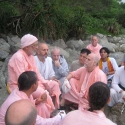
Devotees who are chanting Sri Krsna’s name and practicing pure devotion to Krsna have no karma. For them, suffering and problems that come to them means that Krsna wants them to be humble and tolerant. Such devotees should think, “Oh, I am very wretched.” This humility will come. So, Krsna personally gives them this suffering. It is not the fruit of their karma...
Rama-navami in Mathura
- Details
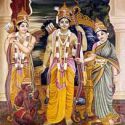
Rama-katha is endless. Sankarsana (Lord Anantadeva) himself continuously sings the glories of Sri Rama, but even with unlimited mouths he is unable to touch the end in any way. We can just relish, and pray that these infinite pastimes may appear in our heart. Tulasi dasa has written Rama-caritra-manasa, which is based on Sri Valmiki's Ramayana. All the pastimes written by Tulasi dasa come from the Ramayana and other Puranas, but the principles of bhakti that he gave there have been taken from Srimad-Bhagavatam. He presented important selected verses, especially from the eleventh canto, and translated them into Hindi poetry.
Glorification of Sri Sita-Rama
- Details
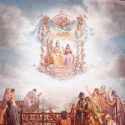
Janaka Maharaja had given the definition of bhakti to Lord Rama’s brother, Bharata. "Anyabhilasita-sunyam, jnana-karmady-anavrtam, anukulyana krsnanu-silanam bhaktir uttama. One who has no other desire than to please Krsna, and who is not influenced by the process of jnana-marga (cultivation of knowledge) karma, and so on, is situated in pure bhakti.” The king told him that nothing can control prema (pure love of God); it has its own law. One who has prema will always consider the desires of his object of love. He has no personal interest. He will always think, "How will my beloved be pleased?" Our real purpose is to please our worshipful deity, God and Guru; not to please ourselves."
The Appearance Day Of Lord Sri Rama
- Details

Who is Sri Rama? He is Krsna Himself, and Sita is Radhika Herself. In order to establish the principles of maryada, regulative etiquette, Krsna appeared in the form of Sri Rama. His associates also appeared in Rama-lila. Gopisvara Mahadeva manifested as Hanuman and Baladeva appeared as Laksmana. Satrugna and Bharata are also manifestations of Krsna because they are His weapons...
Rama Navami
- Details
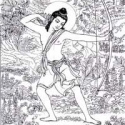
Do you know the history of Ramayana? Maharaja Dasaratha had three hundred and sixty queens, but no sons. One day he went hunting, and in the evening he met a friend of his who was a king. The king had a very beautiful daughter named Kaikeyi, and he engaged her in serving Maharaja Dasaratha. Maharaja Dasaratha was very pleased with both her services and her beauty...
Rama-Navami - Bangkok, Thailand
- Details

Do you know the history of Ramayana? Maharaja Dasaratha had three hundred-sixty queens, but no sons. One day he went hunting, and in the evening he met a friend of his who was also a king. That king had a very beautiful daughter named Kaikeyi, and he engaged her in serving Maharaja Dasaratha, who was very pleased with both her services and beauty...
Rama Navami - The Appearance day of Lord Sri Rama
- Details
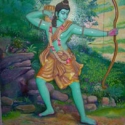
We must be one-pointed to Lord Sri Krsna, not to any other. Do you understand? Why then are we worshiping Lord Ramacandra? Someone may say, "This is not one pointed." But that is not the fact. Sri Krsna is akhila-rasamrta-sindhu. He is the enjoyer of all rasas: dasya (servitude), sakhya (friendship)...
Meeting and Separation in The Pastimes of Lord Ramacandra
- Details

In Treta Yuga, Lord Ramacandra, Sita devi, and Laksmana went to Mamagachi. Under the shade of a large banyan tree, Sita Devi observed that Lord Rama was smiling mildly.
She inquired, “O Lord, what is the cause of your amusement?”
The Appearance day of Lord Ramacandra
- Details

In ancient times there was a king named Maharaja Dasaratha. He was a very, very strong personality. He conquered all kings in the South, North, East, West, and everywhere. Therefore his name was Dasa-ratha, meaning that his chariot went everywhere in the ten directions...
God in Book Form
- Details
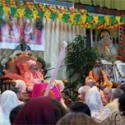
In our brahma-gayatri and in all our gayatri mantras, the word "pracodayat" occurs. "Dhiyo yo nah pracodayat." "Tan no gaurah pracodayat." We are in the disciplic line from Srila Vyasadeva. If you are like Srila Vyasadeva, with no worldly desires at all, then "evam prasanna manasah" – you will be happy by body, mind and soul; you will be able to have the darsana of Lord Krsna. You will see Him face to face, and you will see His sweet pastimes, from beginning to end...
Page 29 of 47

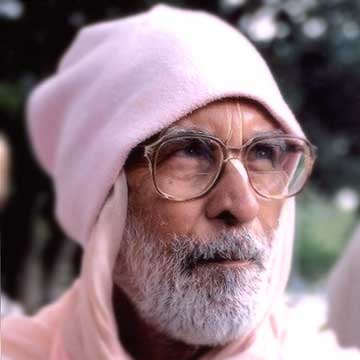
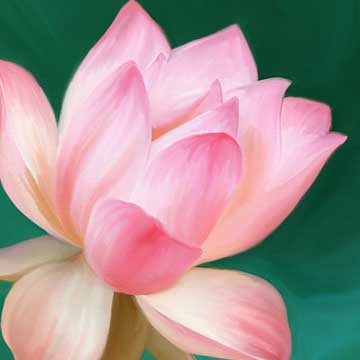
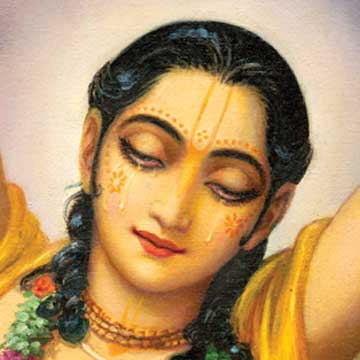



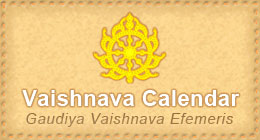


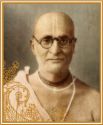 by Śrīla Bhaktisiddhānta Sarasvatī Ṭhākura Prabhupāda
by Śrīla Bhaktisiddhānta Sarasvatī Ṭhākura Prabhupāda



